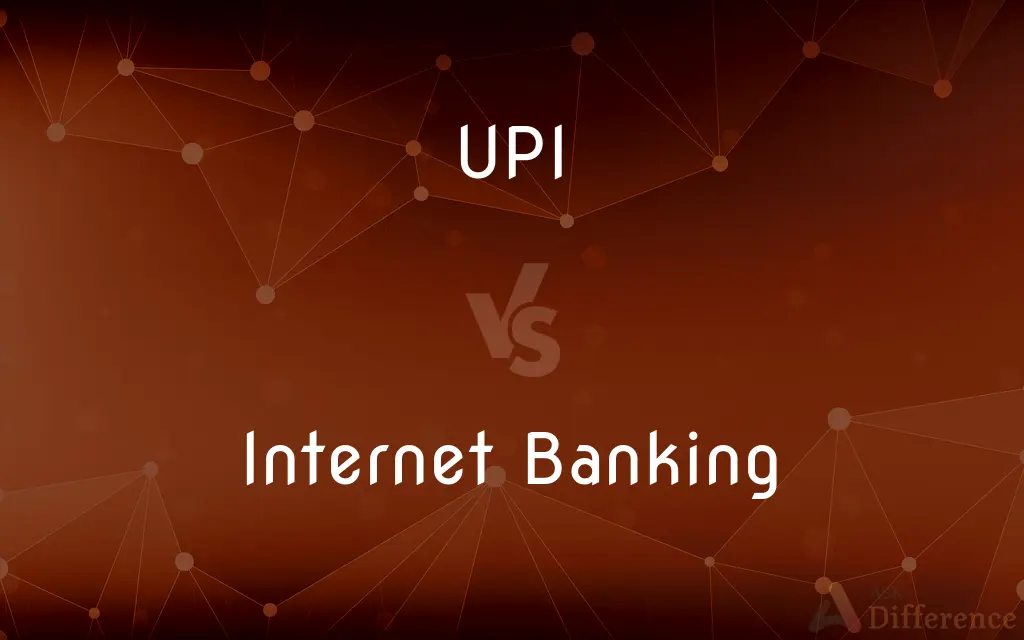UPI vs. Internet Banking — What's the Difference?
Edited by Tayyaba Rehman — By Fiza Rafique — Published on December 26, 2023
"UPI" (Unified Payments Interface) enables instant money transfers via mobile devices, while "Internet Banking" provides online access to various bank account services.

Difference Between UPI and Internet Banking
Table of Contents
ADVERTISEMENT
Key Differences
"UPI" stands for Unified Payments Interface, a system designed specifically to facilitate real-time money transfers between bank accounts using mobile devices. It's a platform that streamlines multiple bank accounts into a single mobile application, combining various banking features and enabling instant fund routing. On the other hand, "Internet Banking" represents the broader concept of accessing and managing one's bank accounts online. It includes services like viewing account balances, transferring money between accounts, and paying bills.
While "UPI" functions primarily for immediate money transfers using mobiles, "Internet Banking" encompasses a wider range of banking operations accessible through a web browser or a bank's dedicated application. Both are digital methods of managing finances, but UPI focuses on ease of transactions, especially peer-to-peer transfers, using a unique identifier like a mobile number or a virtual ID. "Internet Banking," meanwhile, might require more detailed credentials for access and offers comprehensive banking features beyond just fund transfers.
In essence, "UPI" is a subset of the vast spectrum of services offered by "Internet Banking." While UPI excels in facilitating quick transactions without needing bank details, Internet Banking offers an extensive suite, from loan applications to setting up recurring deposits. Users might turn to UPI for a swift money transfer to a friend, while they'd access Internet Banking for a deep dive into their financial portfolio.
Both "UPI" and "Internet Banking" aim to make banking more accessible and convenient. However, their differences lie in their functionality and scope. UPI, with its real-time transfer capabilities, offers a quick transactional experience, whereas Internet Banking provides a comprehensive look at one's banking relationship, with varied functions from account management to loan applications.
Comparison Chart
Primary Function
Instant money transfers via mobile
Access & manage bank accounts online
ADVERTISEMENT
Platform
Mobile-centric
Web browser or dedicated app
Authentication
Mobile number or virtual ID
Detailed login credentials
Range of Services
Mainly for fund transfers
Comprehensive banking services
User Experience
Quick peer-to-peer transactions
Detailed financial portfolio access
Compare with Definitions
UPI
UPI consolidates multiple bank accounts into one mobile app.
With UPI, I can manage my accounts from different banks in one place.
Internet Banking
Internet Banking includes features like funds transfer, bill payments, and more.
Through Internet Banking, I scheduled my monthly utility bill payments.
UPI
UPI is a real-time payment system.
I used UPI to instantly transfer money to my friend.
Internet Banking
Internet Banking can be accessed through a browser or bank's application.
I use my bank's app for Internet Banking to manage my finances on the go.
UPI
UPI is mobile-centric, enabling easy peer-to-peer transfers.
I prefer UPI for quick transfers without sharing my bank details.
Internet Banking
Internet Banking offers a comprehensive view of one's financial status.
I applied for a loan after reviewing my finances on Internet Banking.
UPI
UPI facilitates transactions using unique identifiers.
I sent money via UPI using just a mobile number.
Internet Banking
Internet Banking requires login credentials for secure access.
I set up a strong password for my Internet Banking account for security.
UPI
UPI is part of the broader spectrum of digital banking.
Alongside Internet Banking, UPI has made my financial management easier.
Internet Banking
Internet Banking provides online access to bank account services.
I checked my account balance using Internet Banking.
Common Curiosities
How secure is Internet Banking?
Internet Banking employs multiple layers of security, including encryption and two-factor authentication.
Is Internet Banking limited to fund transfers?
No, Internet Banking offers a range of services, from viewing balances to loan applications.
Is UPI only for peer-to-peer transactions?
While UPI is popular for peer-to-peer, it also supports transactions to merchants and businesses.
Can I view my account balance using UPI?
Typically, UPI is more for transactions, but some apps might allow balance checks. For a detailed view, use Internet Banking.
Do I need different apps for UPI and Internet Banking?
Typically, banks offer Internet Banking features in their apps, and UPI can be accessed through various dedicated apps or integrated into bank apps.
What does UPI stand for?
UPI stands for Unified Payments Interface.
Which is more mobile-centric, UPI or Internet Banking?
UPI is designed specifically for mobile-centric instant transactions.
Can I use UPI without a smartphone?
UPI is primarily designed for smartphones, but there are methods for feature phones using USSD codes.
Can I schedule future payments with Internet Banking?
Yes, Internet Banking allows scheduled and recurring payments.
Does UPI work 24/7?
Yes, UPI supports real-time transactions 24/7.
Share Your Discovery

Previous Comparison
TQM vs. TPM
Next Comparison
Autocratic Leadership vs. Democratic LeadershipAuthor Spotlight
Written by
Fiza RafiqueFiza Rafique is a skilled content writer at AskDifference.com, where she meticulously refines and enhances written pieces. Drawing from her vast editorial expertise, Fiza ensures clarity, accuracy, and precision in every article. Passionate about language, she continually seeks to elevate the quality of content for readers worldwide.
Edited by
Tayyaba RehmanTayyaba Rehman is a distinguished writer, currently serving as a primary contributor to askdifference.com. As a researcher in semantics and etymology, Tayyaba's passion for the complexity of languages and their distinctions has found a perfect home on the platform. Tayyaba delves into the intricacies of language, distinguishing between commonly confused words and phrases, thereby providing clarity for readers worldwide.












































